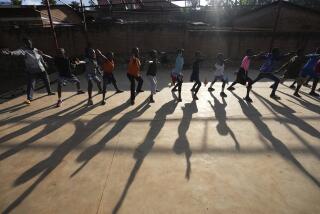U.N. Tribunal Convicts Rwandan Ex-Mayor of Genocide in Slaughter
- Share via
ARUSHA, Tanzania — In the first guilty verdict for genocide handed down by an international court, a former mayor from Rwanda was convicted Wednesday for his role in the 1994 slaughter of more than 800,000 people in his African nation.
The International Criminal Tribunal for Rwanda, the U.N. court based in this northern Tanzanian town, also said its ruling set a precedent by recognizing rape and other forms of sexual violence as acts of genocide when targeted at a specific population with the intent of causing physical and mental harm.
Jean-Paul Akayesu, an ethnic Hutu and mayor of the village of Taba in central Rwanda during the massacre of ethnic Tutsis and Hutu moderates, was convicted on nine counts of genocide, incitement to genocide, crimes against humanity, rape and sexual violence.
He was acquitted on six counts, including a charge of complicity in genocide. The judges ruled that someone found guilty of genocide could not also be convicted of complicity and that prosecutors had failed to prove their case on the other counts.
Genocide is the systematic effort to destroy a nation or ethnic group.
Lead prosecutor Pierre Prosper said he was deeply satisfied with the judgment because the judges in the nonjury trial recognized that Akayesu’s case was one “of betrayal and . . . abuse of power” in which the ex-mayor “failed in his obligation to protect his people.”
The judgment also “recognizes crimes of sexual violence for what they are,” said Prosper, a former assistant U.S. attorney in Los Angeles. “They are horrific crimes, where the suffering continues long after the actual offense.”
The judgment comes two days before the scheduled sentencing of former Rwandan Prime Minister Jean Kambanda, who in May pleaded guilty to genocide and confessed that the systematic slaughter of Tutsis was sponsored by his government.
But although the Akayesu judgment hands the U.N. tribunal a victory in its attempts to prosecute genocide, some Rwandans said they felt the verdict will do little to bring relief to a population still suffering the physical and emotional scars of the massacre.
“I don’t see the people in Rwanda going to the streets to congratulate the international court on this one,” Patrick Mazimhaka, minister of state in the president’s office in Rwanda, told Associated Press. “It has gone on for so long, and I think people have given up.”
Others said the judgment would mean little unless those who were hurt are somehow compensated.
“We need reparation . . . for women who lost their property, who lost their husbands,” said Chantal Kayitesi, president of the Assn. of Widows of the April 1994 Genocide, based in Kigali, the Rwandan capital. “They have been raped and humiliated. They need medical care; they need trauma counseling. If their houses were destroyed, they need new homes. This is more important for women.”
Kayitesi called on the Rwandan government and the international community to ensure that Akayesu compensates the victims of the atrocities he committed and encouraged.
Reading from a summary of a 300-page court judgment, chief judge Laity Kama of Senegal said in the court session that as mayor, Akayesu used his authority over the police and community to incite and supervise the butchering of more than 2,000 people reportedly killed in Taba between April 19 and June 30, 1994. The court heard how Akayesu, 45, a former teacher and father of five, allowed local government offices to be used as sites for murders, beatings and rapes.
The indictment and court testimony identified Akayesu as being present when acts of sexual violence were committed, at times by more than one assailant.
On one occasion, according to the summary of the judgment, Akayesu interrogated a 68-year-old woman and watched while police bound her arms and legs, repeatedly kicked her in the chest and beat her with a gun and sticks. He also threatened to have her killed if she failed to provide information he sought.
Witnesses also told the court that the former mayor, whom prosecutor Prosper described as “a confident and controlling individual . . . used to having his own way,” issued orders to kill specific political opponents.
Akayesu made a statement April 19, 1994, inciting the population against ethnic Tutsis. The date marked the beginning of systematic killings in Taba. Kama said the former mayor, who was also the local boss of the extremist Democratic Republican Movement, “knew of the impact of his statements on the crowd and understood that his statement would be interpreted as an exhortation to kill the Tutsi.”
During the trial, defense lawyer Nicolas Tiangaye of the Central African Republic argued that Akayesu opposed the killings.
Akayesu, who took the stand in his trial, which started in January 1997, denied the charges of involvement in genocide. He maintained that he had been threatened by extremist militia groups for being pro-Tutsi and feared for his life.
Akayesu’s pre-sentencing date was set for Sept. 28. The maximum penalty the tribunal can impose is life imprisonment. Prosecution lawyers said an appeal in the case is likely.
The tribunal, which was created in November 1994 but until now had not reached a verdict in any case, is holding 31 high-profile Rwandans in Arusha, four of whom are on trial.
Rwandan courts--in proceedings condemned by many foreign lawyers as unjust--have tried at least 330 people for involvement in the genocide, and 116 of them were sentenced to death. More than 125,000 people are imprisoned and awaiting trial. On April 24, a Rwandan firing squad executed 22 people convicted of genocide, the first executions for the slaughter.
More to Read
Sign up for Essential California
The most important California stories and recommendations in your inbox every morning.
You may occasionally receive promotional content from the Los Angeles Times.











